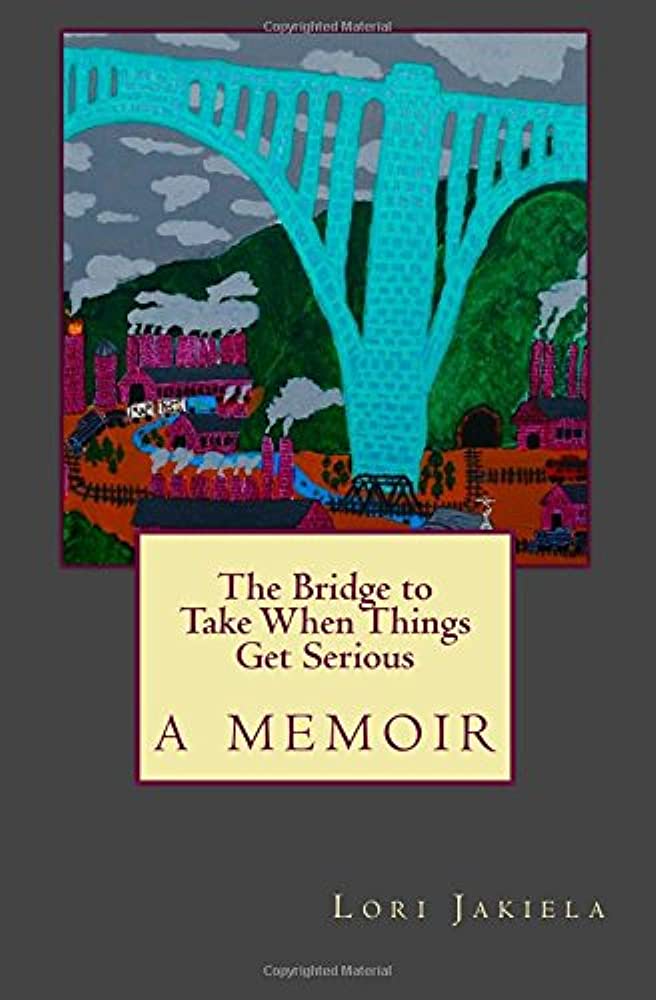The Bridge to Take When Things Get Serious is Jakiela’s second memoir, this time about her return to her childhood home–one that had “paintings [that] were a matching set–two big-eyed moppets dressed as harlequins” and “a crucifix the size of a ham”–to care for her mother, who has a weak heart and other health problems. Jakiela is in her 30s, but she is a single woman who loves the impermanence of her previous life as a flight attendant. She has been married before–for 8 weeks–to a man whom her mother deems enormous in height. Much of the memoir is colored by Jakiela being the only child her of parents–and she is adopted. Jeanette Winterson claims that being an adopted child is like being a book that has the first chapter ripped out. Jakiela might not agree. She appears to want to keep moving so that she is impermanent, perhaps invisible. The easiest way to sum up this memoir is that Jakiela returns to take care of her ill mother and ends when the mother inevitably passes away. Perhaps it is her mother’s illness that makes Jakiela visible, that her mother is a woman who makes Jakiela responsible for her own life, and to live it.
The first page of The Bridge shapes the way I read the whole book. Here, Jakiela describes her mother trying her best to keep from embarrassing her daughter, from coloring her hair to avoid looking like the “old mother,” to worrying that she won’t look smart in front of her daughter’s fellow faculty members at a dinner, to asking that no one come when she is sick. Jakiela responds, “My mother was smart. She was beautiful. It never occurred to me, no matter what, to be embarrassed of her. If I’d understood sooner, I like to think I would have tried to help. I like to think I would have told my mother all the good things she didn’t know about herself.” This simple, elegant beginning was enough to make my own heart tighten a bit, and I couldn’t wait to read on. I was surprised by a lot of what followed.
Near the first third of the book, Jakiela meets Dave Newman, whom her friend believes is perfect for the author. Dave Newman is a writer, too, one I reviewed before, oddly enough. I thought his book was fantastic, and so when I read that Jakiela’s Dave Newman was the same guy, it felt like someone tapping my shoulder when I thought no one was back there. There are many occasions that allow us to get a personal perspective of a writer, but two writers who are still alive and kicking in 2013 was uncanny and possibly one of my favorite aspects of the memoir (even when records of publication were used as tools of hurt/insult). The back of the book spoils it for us: Jakiela is married to Newman and they have two children; however, seeing how these two strong personalities come together and where Jakiela would decide to end her book kept me up reading long after my own husband had fallen asleep in bed next to me.
When Jakiela discovers she is pregnant with Newman’s child (despite using birth control) the two marry almost immediately. The celebration dinner that follows, which includes Jakiela, her mother, her aunt Thelma, and Newman, is like a funeral to the mother: “[My mother] would light me on fire if she could….There’s only so much a child can change for a mother. There are only so many ways to reinvent yourself before you have to own your life.”
While Jakiela’s mother almost seems out to torture her daughter–telling her she has a fat ass when she is pregnant, telling Jakiela she would never have gone out in public if she was pregnant and looked like her daughter, asking Jakiela to move out when Jakiela’s moved in to care for the ill mother–she’s also a smart woman who is right much of the time. A retired nurse, the mother has answers to medical questions about Jakiela’s and Newman’s baby when he is very sick, the same answers the doctors give. It’s impossible to “pick sides,” as if were are allowed to do so in life. Throughout it all, Jakiela is always faithful, always adapting to what life throws at her (she never ends up on that bridge one might take when things get serious). She never cuts off her mother completely, nor does she ever stop loving her.
Life is hectic and fast-paced in this book. The short chapters make it nearly impossible to want to stop (what happens next? and next? and next?). Far from gimmicky, the short chapters actually make this a memoir told in flashes (some a paragraph, some a few pages). While a reader must understand what’s come before to know what she is reading, the chapters stand alone in imagery, tone, and mood. One might be a flashback or a description of a moment or feeling. It might be a piece of what happened overall, a scene, but each is a beautifully crafted gem that demonstrates Jakiela’s skills as a writer.
I devoured this memoir, though I feel like I should have slowed down to appreciate Jakiela’s life more. Really, though, I don’t think she would want me to. The book contains a time period of immense change and great conflict, but also love, personal development, and a chance to learn about others.
I want to thank Lori Jakiela for sending me this book for review and look forward to reading more of her work!


[…] third memoir. I haven’t read Miss New York Has Everything, the first memoir, but I did read and review the second, The Bridge to Take When Things Get […]
LikeLike